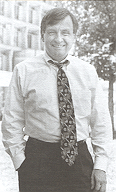|
D E A N ' S M E S S A G E ...........................................................................................................
There is nothing so constant as change, as the old saying goes. But change often creates ripples, affecting people-and the public health-in unanticipated ways. This issue of Public Health discusses how faculty and students at the Rollins School of Public Health are examining the health effects of social change, undergoing changes themselves, and initiating change in public policy when necessary.
Stories profiling students in the Master's International Peace Corps Program and the MD/MPH Program show how students are working to improve the health of those living in developing nations and how their experiences transform them in the process. This issue also profiles new faculty member Keith Klugman, a key player in the international research arena whose groundbreaking work on antibiotic-resistant bacteria brings a new visibility to the Department of International Health. Klugman also has joint appointments in Emory's School of Medicine and the Centers for Disease Control and Prevention, which underscores Emory's pivotal role in infectious disease research, both nationally and internationally. A story of persistent advocacy demonstrates how public health professionals must sometimes drive change to promote health. Visiting professor Godfrey Oakley, former head of the CDC Birth Defects Division, helped instigate the addition of folic acid to all foods labeled "fortified" in the United States, preventing neural tube defects in thousands of American newborns. And so the Rollins School of Public Health begins the new millennium confronting, examining, and questioning change, pushing on into new frontiers in public health.
|

 Our cover story on urban
sprawl discusses research and health advocacy undertaken by
faculty members in Environmental and Occupational Health. Department Chair Howard
Frumkin examines uncontrolled growth in American cities like Atlanta from all angles.
Frumkin writes and speaks on the issue at every opportunity, urging his public health
colleagues to help stem runaway suburban growth and the
health problems that come with it. Paige Tolbert is leading one of the most extensive studies of the relationship
between air quality and health ever conducted. And Barry Ryan is working to better
understand the mechanisms behind air pollution and acute cardiovascular events.
Our cover story on urban
sprawl discusses research and health advocacy undertaken by
faculty members in Environmental and Occupational Health. Department Chair Howard
Frumkin examines uncontrolled growth in American cities like Atlanta from all angles.
Frumkin writes and speaks on the issue at every opportunity, urging his public health
colleagues to help stem runaway suburban growth and the
health problems that come with it. Paige Tolbert is leading one of the most extensive studies of the relationship
between air quality and health ever conducted. And Barry Ryan is working to better
understand the mechanisms behind air pollution and acute cardiovascular events.